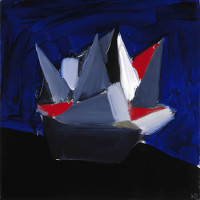4 Poets in Magma

Magma is a go-ahead poetry magazine that chooses a different editor for each of its thrice yearly issues. It is generally represented at the Ledbury Poetry Festival, and launches its poets at the Troubadour Coffee House in Old Brompton Road, London SW5. There are generous review sections and, like many others in the UK, the magazine receives funding from the Arts Council.
The issues put on line by the Poetry Library date from 2005-6, and include many poems not displayed for copyright reasons. Most of the work, I fear, is closer to prose, and not very interesting prose either, but I’ve picked four examples that offer something better.
The first is In Praise of Land Drains by Jane Routh, who modestly describes herself as managing a woodland and keeping a flock of geese. The poem is at: http://www.poetrymagazines.org.uk/magazine/record.asp?id=24824
It’s a meditation or interior monologue, which opens effectively with:
On a fine day after rain, the wind dropped, listen
anywhere moles have burrowed echo chambers
and you’ll hear splashing underground.
From which we think on to how the land drains were constructed, in the past and nowadays with heavy machinery, and for what purpose. The incidents are fitted neatly into stoutly-built lines, and the piece ends as effectively as it began:
Shift that slab!
and the whole seething, swirling mass
gurgles off down Robin’s drain, still sucking
the land back into shape just as he knew it would.
Eric Paul Shaffer is the winner of numerous poetry prizes, has published five collections, and teaches at Honolulu Community College. His A Humanity of Glass can be read at:
http://www.poetrymagazines.org.uk/magazine/record.asp?id=18896
The piece is demanding one, an extended conceit – if I understand it correctly -on the fragility of human lives, here conceived as made of brittle glass. It opens challengingly with what such people can do:
All crave an end to light, but we people of glass
need simply sprint at stone and shatter bone
to silver splinters, or torch our homes,
heat ourselves within to a fierce, orange glow,
The conceit allows us to concentrate on the essences of things, which we see more clearly:
Thoughts are clear. Like the sun,
we cannot conceive darkness, know no shadow
of our own. Warmed by sunlight, we are content,
for appearance means nothing to crystalline skin.
It’s a long poem that ends strongly and beautifully with:
Invincible to thorns, we know roses only
as they open, petal by petal. Finding each other
is luck, and love, no longer a mystery,
becomes a shadow we cannot cast, leaving us
only sunlight and shining voices in crystal air.
Billy Ramsell’s Black Noise has a similar ‘otherness’, and can be read at: http://www.poetrymagazines.org.uk/magazine/record.asp?id=18734
The poem introduces itself through the title:
Black Noise
is superficially quite similar to its white and well known cousin,
taking the form, most often, of some standard drone;
for example radio interference or static hiss. It differs, however,
in one most fundamental aspect, being but a facsimile or clone
of genuine sound. It has been described as an ‘aural shadow’
or ‘sonic after-image’, or, memorably, as ‘a mingled blizzard
of second hand voices’. It is a ghost that wanders darkly through
the chambers of the ear forever, for once listened to it can never be unheard.
Again, through this device, we can take an imaginary journey, here into the life of someone introduced at:
Take this woman: late twenties, gray tracksuit, longish hair.
Who is walking along the beach and listening:
She angles her head but it’s still there,
staining the water’s insistent sibilance and the haranguing of the gulls.
It is sursurant, and repetitive, and is no longer in the ear.
Billy Ramsell lives in Cork. His work has appeared widely and was short-listed for a Hennessey Literary Award in 2005.
Linda Black’s This little stretch of life is modeled on the letters of Elizabeth Bishop and has something of her artful inconsequentiality. Ms Black studied at Leeds College Art and the Slade, and her poems have appeared in various magazines. This one can be read at:
http://www.poetrymagazines.org.uk/magazine/record.asp?id=18483
We start with:
There are sanctuaries, small melting snowdrifts
here and there; an atmosphere
easy to crawl into.
When we have once again cast off this mortal body, and can enter into communion with other things. But through this semi-real narrative runs a sly, self-deprecating humour:
I am tempted
by waves, the transparent sea. I think my heart
beats twice a day – a very slight
ailment.
The ending is a little heavy, but the two penultimate lines carry off the fey distraction admirably:
Excuse
my disconnectedness – I must go see
what everything is doing
